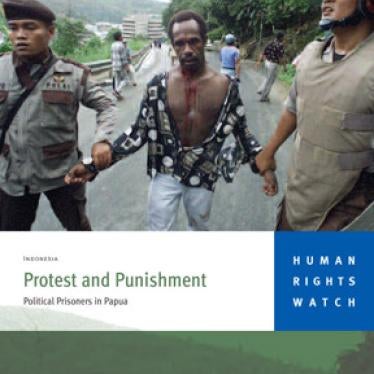(New York) - The ruling by Indonesia’s constitutional court to declare unconstitutional a set of laws that criminalize free expression is a bold and welcome decision, Human Rights Watch said today. All prisoners currently serving sentences under these laws should be immediately released.
On July 17, 2007 Indonesia’s Constitutional Court declared unconstitutional articles 154 and 155 of Indonesia’s Criminal Code, commonly known as the “hate sowing” (Haatzai Artikelen) offenses. Articles 154 and 155 criminalized “public expression of feelings of hostility, hatred or contempt toward the government” and prohibited “the expression of such feelings or views through the public media.” The articles specified prison terms of up to seven years for violations. Left over from the Dutch colonial administration, these offenses were often used by the government to restrict peaceful criticism of the government. Political opponents, critics, students, and human rights defenders have been targeted and silenced under the laws.
“The government should immediately release all those convicted under these laws, whose very essence is to limit free expression in Indonesia,” said Charmain Mohamed, Indonesia researcher at Human Rights Watch. “The court’s decision to strike down this legislation raises hopes that it will also tackle the myriad other repressive laws still on Indonesia’s books.”
Human Rights Watch called on the Indonesian government to publicly acknowledge the court’s decision and to immediately and unconditionally release all those currently imprisoned under the laws. Others imprisoned under similar laws restricting free expression should also be released. Human Rights Watch also called on the government to instruct prosecutors to drop all pending charges for peaceful political expression and not to file any such cases in the future.
Current cases include Yusak Pakage and Filep Karma, who were sentenced in April 2005 to 10 and 15 years in prison respectively for having raised the Papuan independence flag in the province of Papua. Among the charges against them was “publicly stating hostility, feelings of hate or offense toward the government of the Republic of Indonesia” under article 154 of the Criminal Code. Human Rights Watch documented their case in “Protest and Punishment: Political Prisoners in Papua”. Human Rights Watch has also documented other similar cases in “A Return to the New Order?”
“Yusak Pakage, Filep Karma, and others like them should be immediately released,” said Mohamed.
Human Rights Watch called on the drafters of Indonesia’s new criminal code to remove any provisions inconsistent with the letter and spirit of the constitutional court’s decision and to repeal any legislation used to prosecute and imprison individuals engaged in peaceful political expression.







